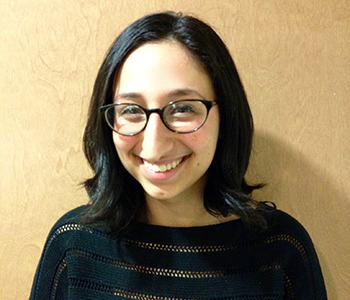
Aliza Caplan
Aliza Caplan is about to graduate from the University of Pennsylvania, but it wasn’t until her final semester of her undergraduate studies that she took one of her favorite courses: “Witnessing, Remembering, and Writing the Holocaust” with Professor Liliane Weissberg.
Weissberg is USC Shoah Foundation’s Rutman Teaching Fellow. The fellowship provides summer support for a member of the UPenn faculty to use testimony in a course and give lectures about his or her research. Caplan, a sociology major and Jewish Studies minor, decided to take the course as an elective because she had heard that Weissberg was an exceptional teacher and she thought the concept was interesting.
“The way she wove together all these different sources, from the testimonies to different Holocaust films to literature and architecture — the pieces that she selected for us to focus on — wove such a fascinating narrative,” Caplan said. “Even though I’ve done Holocaust education in the past, this was totally different.”
“For them to share their story and experience is incredibly powerful... as a student."
One of the things that made the course so unique was that instead of choosing to focus on the history of the Holocaust and the experience of both victims and survivors, as most traditional education does, it instead focused on how today we remember the Holocaust as witnesses. As part of that, the class analyzed how different testimonies compared including the VHA and the Fortunoff Video Archive for Holocaust Testimonies.
“USC Shoah Foundation has such a range and such a level of detail,” Caplan said. “You do have the interviewer driving the interview with historical questions to fact check as it goes on, but also you have some room for reflection and emotion to be included.”
Caplan said that though the class studied a wide range of forms of remembrance, including memoirs, fiction, films, memorials, monuments, art, and architecture, there was something special about listening to testimony.
“There’s nothing like hearing from someone who was there and being able to see someone’s face and their mannerisms,” she said. “For them to share their story and experience is incredibly powerful and really impact as a student.”
The class had an open-ended final project that required they use testimony as well. Caplan decided to focus on the role of female liberators during the war because in the past she had mainly focused on the testimony of survivors.
“Having access to this quantity of different stories and experiences [in the Visual History Archive] is really unparalleled,” she said. “Just for me to look at female liberators, that’s a population that I just would not be able to get to know without it.”